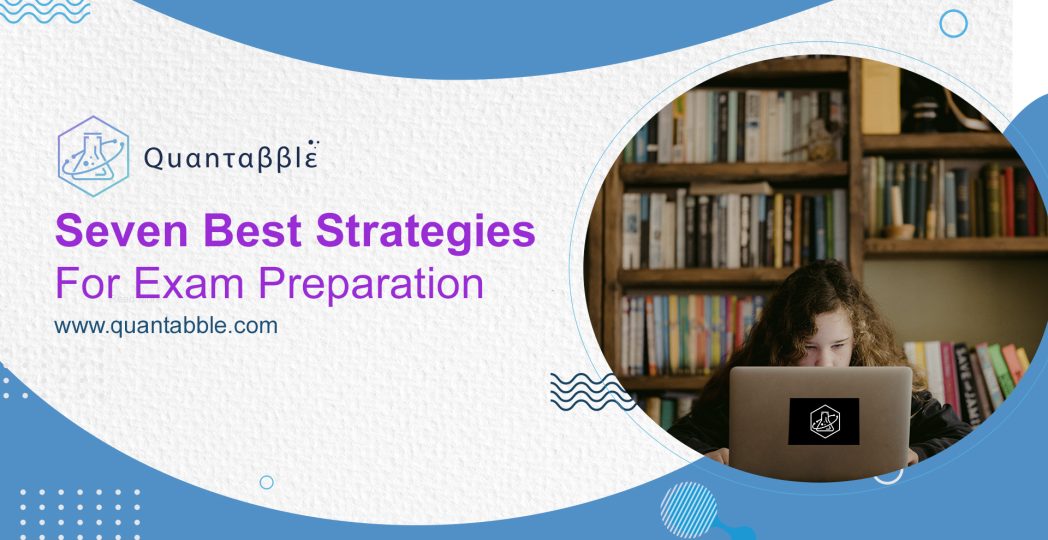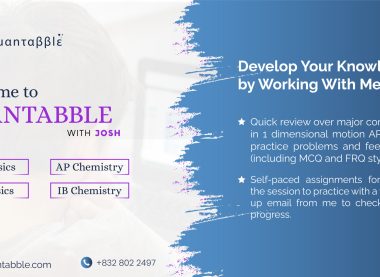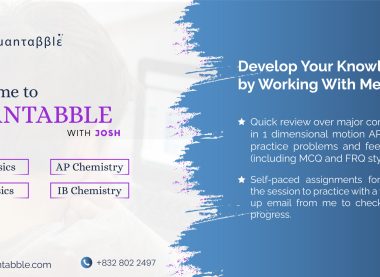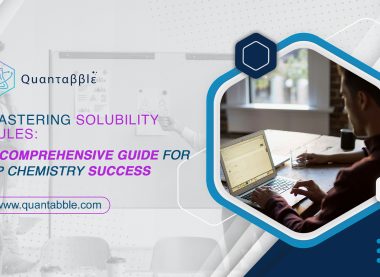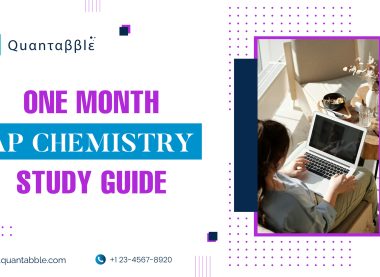Seven Best Strategies for Exam Preparation
Preparing for an exam efficiently and effectively involves various strategies to optimize your study routine. Maximize your exam preparation with Quantabble’s expert tutoring services. Our personalized strategies and experienced tutors offer the one-on-one attention you need to tackle any test with confidence. Whether you’re preparing for AP exams, SATs, or any other challenge, let us guide you to your highest score yet. Discover how our tailored approach can enhance your study routine. Here are seven proven approaches that can significantly enhance your test preparation:
1. Understand the Exam:
Comprehending the exam structure, question types, and topics covered is crucial. Review past test papers or syllabi to grasp the exam’s format and focus areas.
Understanding the structure and content of an exam is foundational to effective preparation. Start by analyzing the exam format, question types, and weightage of each section. Reviewing past papers or syllabi can provide insights into the exam’s scope and focus areas. Identify whether the exam emphasizes multiple-choice questions, essays, practical applications, or specific topics.
Understanding exam’s nuances helps tailor your study plan, allowing you to allocate more time to challenging sections or prioritize certain topics. Additionally, knowing the time constraints per section enables you to practice time management skills during your preparation. Familiarizing yourself with the exam’s requirements ensures you’re not caught off guard on test day, allowing for a more confident and well-prepared approach when tackling each section.
2. Develop a Study Plan:
Create a detailed study schedule that allocates time for each subject or topic. Break down the material into manageable sections, setting realistic goals for each study session.
Creating a structured study plan is pivotal for effective test preparation. Start by outlining all the topics or subjects that will be covered in the exam. Break down these subjects into smaller, manageable sections or chapters. Allocate specific timeframes for each section based on its complexity or your comfort level with the material. Set achievable goals for each study session and incorporate regular reviews to reinforce learning.
Additionally, factor in practice tests and mock exams in your schedule to simulate real exam conditions. Flexibility is key; adjust your plan as needed to accommodate unexpected challenges or revisit difficult concepts. A well-structured study plan not only ensures comprehensive coverage of the material but also helps in maintaining focus, managing time efficiently, and reducing stress during the preparation process.
3. Active Learning Techniques:
Engage in active learning methods such as summarizing notes, creating flashcards, teaching concepts to others, or participating in study groups. Active learning aids in better retention and understanding.
Active learning techniques are invaluable for effective test preparation. Engaging in active learning involves methods that stimulate your thinking and enhance comprehension. Summarizing notes, creating flashcards, and generating mnemonic devices for complex concepts aid retention. Teaching the material to others, participating in study groups, or discussing topics encourage deeper understanding through articulation and interaction. Practice problems, quizzes, and applying learned concepts in real-world scenarios reinforce learning actively.
Active learning techniques shift from passive reading to active engagement, promoting better retention, understanding, and application of the material. Incorporating these methods into your study routine fosters a more dynamic and effective learning process, significantly improving your readiness for the exam.
4. Practice Regularly:
Consistent practice through mock exams, quizzes, and timed practice sessions is essential. Simulating test conditions helps familiarize you with the exam format and improves time management skills.
Regular practice is fundamental in achieving success in test preparation. Consistent engagement in practice tests, quizzes, and timed study sessions is essential. Regular practice helps familiarize you with the exam format, question types, and topics commonly covered. Simulating test conditions during practice sessions enhances your ability to manage time effectively and reduces anxiety during the actual exam. It also highlights areas requiring further review or improvement.
Regular practice aids in strengthening your knowledge base, reinforces key concepts, and improves problem-solving skills. It’s crucial to incorporate a variety of practice materials aligned with the exam to expose yourself to different question formats and difficulty levels. Dedicate consistent intervals throughout your study routine to practice, allowing for incremental progress and boosting confidence for the actual test day.
5. Review and Reinforce:
Regularly review previously studied material to reinforce retention. Focus on weak areas and spend extra time addressing these topics to improve comprehension.
Regularly reviewing and reinforcing previously learned material is crucial for effective test preparation. Set aside dedicated study sessions to revisit topics you’ve covered. Reviewing helps solidify understanding and aids in long-term retention of information. Work on the sections that you find difficult or want more clarity. Actively engage with the material by summarizing key points, creating outlines, or solving practice problems related to those topics. Reinforcing your knowledge through repeated exposure strengthens your grasp of the concepts, making it easier to recall during the exam.
Additionally, periodic reviews prevent forgetting and ensure that you maintain a comprehensive understanding of the entire subject matter. Incorporate review sessions strategically within your study plan to continuously reinforce your knowledge base, leading to improved performance and confidence on test day.
6. Utilize Various Resources:
Explore a range of study resources such as textbooks, online tutorials, educational videos, or supplemental materials to gain different perspectives on challenging topics.
Utilizing a diverse range of study resources is paramount in comprehensive test preparation. Explore textbooks, online tutorials, educational videos, and supplementary materials to gain multifaceted perspectives on the subject matter. Textbooks often provide in-depth coverage of topics, while online tutorials and videos offer visual and interactive learning experiences. Supplemental materials, such as practice books or specialized guides, may offer different approaches to understanding complex concepts. Engaging with various resources allows you to access different explanations, examples, and perspectives, aiding in a deeper understanding of challenging topics.
Moreover, combining resources helps cater to different learning styles, ensuring a more holistic and robust grasp of the material. Experiment with different resources to identify those that resonate best with your learning preferences, incorporating them into your study routine for a more comprehensive and effective test preparation.
7. Stay Healthy and Relaxed:
Maintain a balanced lifestyle by prioritizing sleep, nutrition, and exercise. Taking breaks during study sessions prevents burnout and helps maintain focus.
Implementing these seven strategies into your test preparation routine can significantly enhance your understanding of the material, improve performance, and reduce stress during the exam. Adjust these strategies to suit your learning style and needs for optimal results.
Maintaining a healthy lifestyle and managing stress play pivotal roles in effective test preparation. Prioritize adequate sleep, proper nutrition, and regular exercise to ensure optimal physical and mental health. Ample rest and quality sleep enhance memory retention and cognitive functions, aiding in efficient learning and information recall.
A balanced diet and hydration fuel brain function, boosting concentration and focus during study sessions. Additionally, incorporating exercise or relaxation techniques like meditation or yoga alleviates stress and improves overall well-being. Managing stress is vital; avoid last-minute cramming and practice mindfulness or relaxation techniques to stay calm and focused. Balancing study sessions with breaks ensures mental rejuvenation and prevents burnout. By prioritizing self-care, you optimize your ability to absorb information, maintain concentration, and perform at your best during the test.

